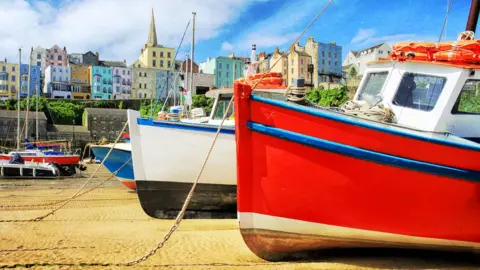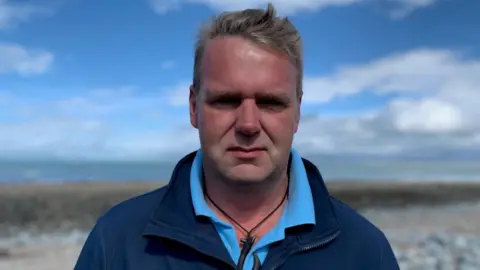Tourism tax in Wales: Levy could apply to Welsh holidaying in Wales
 Jackie Bale | Getty Images
Jackie Bale | Getty ImagesVisitors booking stays in Wales could face a tourism tax, including those who already live in Wales, the Welsh government has said.
A public consultation will consider if overnight visitors should pay a levy on top of their holiday costs.
The document reveals, if introduced, the tax would be applied to campers as well as people from Wales holidaying within the nation.
The Welsh government said the tax would support "sustainable tourism".
Some in the tourism industry fear it would put off visitors already cutting back due to higher bills and a charge could hit businesses struggling with rising bills.
Welsh Conservatives said the plan could put livelihoods at risk.
The proposal - which will take years to become law - comes after some beauty spots saw large increases in visitors after coronavirus travel restrictions were lifted, with concerns some areas could be overwhelmed.
Under the consultation, published on Tuesday, councils would choose whether to introduce the charge "according to the needs of their communities", but it does not say how much the charge could be.
But one council leader has already said her authority was "not minded" to adopt such a tax "at the moment".
And a campsite boss has said business could be lost if some authorities imposed a tax, while others did not.
The consultation document, published by the Welsh government, reveals the tax would apply to any visitor, regardless of whether they live in Wales or have travelled from outside, and it would apply to any sort of accommodation, including caravans, motorhomes, holiday lets, and hotels.
Officials say all overnight stays in Wales would be liable to the charge, including business visits, but it is anticipated some groups of people may be exempt.
Potential exemptions being proposed include Roma and Gypsy Traveller primary residence sites, and for those needing emergency accommodation, such as homeless people and domestic abuse victims.
BBC Wales has been told the legislation, part of an agreement between Labour ministers and Plaid Cymru, may not be introduced until 2024, but it could be later than that.
Finance and Local Government Minister Rebecca Evans said the intention was to "bring about a sense of shared responsibility between residents and visitors, to protect, and invest in, our local areas".
"By asking visitors - whether they have travelled from within Wales or from further afield - to make a small contribution towards maintaining and enhancing the place they are visiting, we will encourage a more sustainable approach for tourism," she said.
Plaid's Cefin Campbell said: "While Wales may be the first place in the UK to introduce such a levy, we do not believe it will be the last - as we have seen recently, a visitor levy may soon be introduced in Edinburgh so Wales is not alone."
But Richard Workman, a director at Shell Island in Gwynedd, said there were "a lot of questions that need to be answered" as soon as possible.
"According to what we've read, each individual council will be able to implement their specific rate," he said.
"You could have Gwynedd council implementing it at one rate and a council down in south Wales saying 'we don't need to do it'.
"If we've got to charge extra on top, and another council isn't implementing it, we could lose our customers to a different area altogether."

Mr Workman said introducing the tax on top of the cost of living and high fuel prices for people travelling for trips meant it was "the wrong time to do it" and he feared people would avoid holidaying in Wales.
"Getting people across the border into north Wales is the hardest thing," he added. "If there's another tax on top, they'll go to the east coast of England," he said.
Vale of Glamorgan Council leader Lis Burnett, said her authority had "no plans to introduce a tourism levy".
"We understand that the proposal is to give discretion to councils as to whether they do and we are not minded to at the moment," she told the Local Democracy Reporting Service.
'It depends how much it is'

BBC Wales spoke to three campers visiting Shell Island from Derbyshire. It is one of the UK's largest campsites, with 800 pitches.
Chloe Riley said: "In order to come back to Shell Island in Wales I would still pay the tax… but it would depend on how much that was going to be."
Her partner, Matthew Goff, agreed he would be willing to pay a tax to return to "magical" Shell Island, but added: "We're a nation of taxpayers. We pay tax on everything. So, why introduce a new tax, in order just to go on holiday?
"People save hard, and is it really the right time to introduce more taxes when everything else has just shot through the roof?" he asked.
'Might think twice'
Another, David Langsdale, said he had been camping in Wales for years, but the introduction of a tax "might make me think about going somewhere else if I had to… I'm a firm believer that I pay taxes in Derby, and when I come on holiday I shouldn't have to pay tax for anywhere else."
"It might make me think twice about coming to Wales generally," he added.

Chris Frost, chairman of North Wales Tourism, said businesses understood why the Welsh government was looking at introducing the charge after the influx of visitors, but he said businesses were still struggling to recover post-pandemic.
Mr Frost, who owns Manorhaus restaurant with rooms in Ruthin, Denbighshire, said many businesses were still paying back support after being closed or restricted during the pandemic, adding he was going to be paying over £900 a month for the next four years.
"With the surges in the supply chains and utilities and food costs, employment costs rising, the cost of doing business at the moment is just absolutely a massive challenge for the industry," he said.
"Now is not the time for a consultation on a proposed tourism levy."
'Not ideal'
Wander Woman travel podcast host Phoebe Smith told BBC Radio Wales introducing a tax for people using accommodation was a "less than an ideal solution".
"The people who tend to make the most damage are those who come in and don't give so much back: people on coach trips, people on day trips and people who come on camper vans who don't even use a camp site, they drive in and bring their own food in," she said.

Paul Williams, general manager of Llandudno Pier, said a potential tax was a "very bad idea, especially for us being one of the major tourist attractions in north Wales".
"We've just come out of Covid last year, the last thing we need is a tax on tourism," he said. "It's one of the biggest sectors in north Wales.
"To put a tax on top of it just seems ludicrous, especially at this time."

Analysis by David Deans, BBC Wales political reporter
Currently the Welsh tourism tax - which the Welsh government calls a visitor levy - has lots of unknowns attached to it.
We do not know how many councils might be interested in the funding, nor what the economic situation will be like when the policy is implemented, because we don't know when it will become law.
We are told it is years away before the Senedd passes the legislation, which means it is likely plans for a levy in Scotland will come to fruition first.
There are questions too about how the money will be used.
As things stand, councils would get the cash to spend how they see fit, although ministers would like it spent on things that improve the experience for visitors and contribute to the costs related to tourism.
If councils are allowed to spend the money with no strings attached, that might be tricky to ensure. We have been told the Welsh government is open to restricting its use in some way, although we were also told that it's difficult to do.

The Welsh government said there were more than 90m visits to Wales in 2019, resulting in a combined spend of more than £5.9bn. Of those, 10m were overnight stays, bringing in more than £2bn.
The proposal is part of the Welsh government's cooperation agreement with Plaid Cymru where local authorities would be able to introduce the levy and use the money raised to invest in their local area.
Ministers agreed it was a "hot topic," but claim levies are common in tourism destinations around the world.
Rebecca Evans has previously said any levy would allow councils to "manage and invest" in local services, ranging from cleaning beaches to maintaining toilets and footpaths.
Welsh Conservative shadow tourism minister Tom Giffard said: "This policy will put livelihoods at risk as one in seven jobs - 200,000 rely on the tourism industry. What's more, there has been no guarantee that this tax would see any improvement to tourism offers in local communities, and the proceeds are instead likely to get sucked up into council coffers.
"The decision to press ahead with this policy is nothing short of arrogance from the Labour Party, a symptom of their perpetual rule here in Wales."
